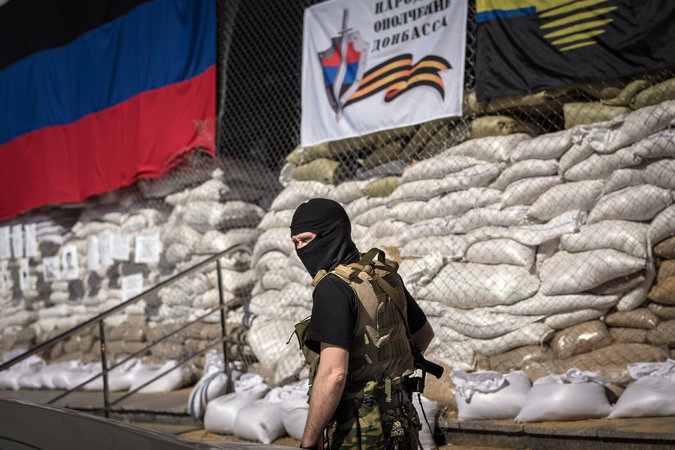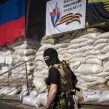
Russia Fomenting Chaos in Ukraine’s Donbass Despite Geneva Statement
Publication: Eurasia Daily Monitor Volume: 11 Issue: 81
By:

The Geneva Joint Diplomatic Statement of April 17, 2014 (see EDM, April 30) has gone the way of the 1994 Budapest Memorandum, the 1997 Russia-Ukraine inter-state treaty, the 1997 and 2010 agreements on Russia’s Black Sea Fleet in Ukraine, and other international and bilateral documents related to Ukraine’s security. They have all become a dead letter.
Russian President Vladimir Putin initiated the bilateral negotiation with the United States that led to the Geneva Statement. In his March 28 telephone call to US President Barack Obama (apparently, Putin’s first call after multiple Obama calls to him about Ukraine), Putin suggested that Foreign Affairs Minister Sergei Lavrov and US Secretary of State John Kerry meet on March 30 in Paris to work out a mutually acceptable position on Ukraine. The European Union and Ukraine eventually subscribed to what became the quadripartite Geneva Statement (Interfax, March 30–April 17).
All parties fell short of their goals in the negotiation. Moscow sought US consent to the “federalization” of Ukraine, hoping to cast this project as an international rather than purely Russian initiative. Moscow also pressed to postpone Ukraine’s presidential election until December, so as to prolong instability in the country. Alternatively, Moscow would “allow” the election to be held on schedule on May 25, particularly in Donbass (geographic area in eastern Ukraine, also known as the Donetsk Basin, which encompasses the Donetsk and Luhansk regions), if Kyiv committed in advance to adopting a “federal” constitution.
The US rejected that option, as does Kyiv, defending Ukraine’s unity in the negotiations. For its part, the US sought Russian recognition of the Ukrainian government, as well as assurances that Russia would not disrupt Ukraine’s upcoming presidential election in the country’s east. To advance those goals, Washington hoped for at least a modicum of rapprochement between the Russian and Ukrainian delegations. Instead, Moscow continues treating the Ukrainian government as illegitimate, and uses that argument to justify secessionist movements in eastern Ukraine.
On April 17, the Russia-US-EU-Ukraine statement was released in Geneva. That same day, Russia orchestrated three events that nullified the Geneva statement and escalated the assault on Ukraine. In his annual phone-in dialogue with citizens of Russia, Putin openly challenged Ukraine’s rights of sovereignty over six Ukrainian regions (“Novorossiya,” far beyond Donbass). In Donetsk, pro-Russia groups from six Ukrainian regions (largely overlapping with Putin’s claim) launched a South-East Movement for the Federalization of Ukraine. And also in Donetsk on April 17, the interim secessionist leader Denis Pushilin announced that his forces are not bound by the terms of the Geneva document. Almost certainly, Lavrov had advance knowledge of those developments during the Geneva negotiations. There, he circulated the South-East Movement for Federalization’s program, and demanded amnesty for the Donetsk secessionist leader, “people’s governor” Pavel Gubarev, for whom Pushilin (see above) is currently deputizing (Interfax, April 17, 18).
From the first day of the joint statement’s applicability (April 18) to date, the US, EU, and Ukraine have protested in vain to Russia for escalating the tensions, instead of de-escalating. In a declaration of unprecedented length and vehemence, Secretary Kerry denounced Russia’s military threats and paramilitary operations against Ukraine, sabotage of Ukraine’s upcoming presidential election, and inflammatory propaganda on Russian state television (State Department press release, April 24). President Obama warned Russia of possible “increased sanctions”; and on April 25, the US and EU lengthened the list of Russian officials and businessmen subjected to personal sanctions. German Chancellor Angela Merkel urged Putin by telephone to adhere to the Geneva document. High Representative Ashton expressed the EU’s “grave concern,” then outright “alarm” about Russia’s failure to restrain the illegal armed groups in eastern Ukraine (EU press releases, April 24, 29).
The April 17 Geneva Statement did stipulate that “all sides must refrain from any violence,” “all illegal armed groups must be dissolved,” and all illegally occupied public spaces and premises “must be vacated.” By that date, Russia’s armed proxies had already captured the seats of authority in at least ten cities and district centers in Ukraine’s Donbass (see EDM, April 16).
In the fourth week of April, pro-Russia armed groups seized the administrations of at least four more towns in Donetsk region (Alchevsk, Kirovske, Sverdlovsk, Kostiantynivka) and all the law-enforcement institutions in the city of Luhansk. They introduced heavier weaponry, such as grenade launchers, at their unlawful checkpoints; brutally dispersed pro-Ukraine rallies in Donetsk and elsewhere; and kidnapped dozens of pro-Ukraine citizens, murdering several of them. An armed group detained eight OSCE military observers in the secessionist stronghold of Slovyansk and are holding them as bargaining chips. The armed secessionist leaders insist that they were not a party to the Geneva document and are therefore not bound by its terms. And Moscow declines to restrain them (Interfax-Ukraine, UNIAN, April 25–30).
Thus, in spite of the Geneva Statement, Russia is fomenting chaos in Ukraine’s east. Moscow is drawing within reach of its goal to derail Ukraine’s May 25 presidential election in the Donetsk and Luhansk regions (Donbass). Ahead of that presidential election, secessionist groups plan to proclaim a “People’s Republic of Donetsk,” or possibly of Donbass, through a “referendum” on May 11. Although they lack the capacity to administer any referendum, Moscow’s propaganda will probably undertake to legitimize the attempt, and use it to advance Ukraine’s “federalization” under the threat of outright secession.




